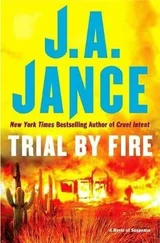Frances Fyfield - Trial by Fire
Здесь есть возможность читать онлайн «Frances Fyfield - Trial by Fire» весь текст электронной книги совершенно бесплатно (целиком полную версию без сокращений). В некоторых случаях можно слушать аудио, скачать через торрент в формате fb2 и присутствует краткое содержание. Жанр: Полицейский детектив, на английском языке. Описание произведения, (предисловие) а так же отзывы посетителей доступны на портале библиотеки ЛибКат.
- Название:Trial by Fire
- Автор:
- Жанр:
- Год:неизвестен
- ISBN:нет данных
- Рейтинг книги:3 / 5. Голосов: 1
-
Избранное:Добавить в избранное
- Отзывы:
-
Ваша оценка:
- 60
- 1
- 2
- 3
- 4
- 5
Trial by Fire: краткое содержание, описание и аннотация
Предлагаем к чтению аннотацию, описание, краткое содержание или предисловие (зависит от того, что написал сам автор книги «Trial by Fire»). Если вы не нашли необходимую информацию о книге — напишите в комментариях, мы постараемся отыскать её.
Trial by Fire — читать онлайн бесплатно полную книгу (весь текст) целиком
Ниже представлен текст книги, разбитый по страницам. Система сохранения места последней прочитанной страницы, позволяет с удобством читать онлайн бесплатно книгу «Trial by Fire», без необходимости каждый раз заново искать на чём Вы остановились. Поставьте закладку, и сможете в любой момент перейти на страницу, на которой закончили чтение.
Интервал:
Закладка:
Evelyn knew this secret route from her own house so well she could have managed it in her Sunday best, but today she wore T-shirt and jeans and, oddly enough, with such casual teenage attire, a pair of very bright, sparkling paste earrings.
Even The Crown had attracted custom. Today's lunchtime fare had been vegetarian, Bernadette's new ploy to attract the discriminating Branston customer, Featherstones' best with an Irish flavour. The fact that most of the food remained uneaten in relation to the amount ordered only reflected the Featherstones' deafness to complaints. 'Aren't they all fools?' snorted Bernadette, dumping slabs of her grey bannock bread into a plastic sack. 'Don't know a good thing when they eat it.'
For once, she and Harold were in accord, a temporary but regular Sunday afternoon peace, especially in summer, when Harold was mellowed by whisky and custom, content to sit in the kitchen discussing plans, believing in the success of their joint venture until his head began to throb and the worse temper resumed. Evening customers received short shrift in The Crown, but for now, all was sweetness and light.
Aren't they all fools, then? You're right,' he was replying, pinching Bernadette's behind as she passed him, dropping litter on her way to the bin and ignoring it. 'But we'll show them, Bernie, won't we? I've another idea. Now we've got the place in shape, did you see all the people in here today? They're cottoning on at last. I'll set on the garden.
Somewhere else for the buggers to go. Might even go back and do something about that garden bar. The summerhouse, I mean. Few enough places with this much ground around, you know.'
Bernadette nodded vigorously but silently, content to keep the peace. Silence was always preferable on the subject of the summerhouse. Like Harold, she was aware that the most recent revamping of The Crown's bar had eaten up another segment of the inheritance misguidedly left Harold by a doting father, the same inheritance depleted year by year since they acquired the premises with the first chunk of it, abandoning their London jobs in the process, because of William, because of wanting a better life, because of all sorts of things they could not discuss, even now.
Again like Harold, she was unaware that the same new decor – floral walls, heavy unmatched chintz curtains, checkerboard carpet, red upholstered seats with varied cushions – was a savage onslaught on the eye, almost psychologically disturbing to anyone who sat in it long enough. Helen and Bailey had counted sixteen different patterns in that room and wondered, with enormous, frankly snobbish amusement, how much expense had gone into the creation of such ghastly disharmony.
Along with Harold, Bernadette thought it was beautiful, enough of the gypsy in her to adore dizzying colour, but when it came to Harold's other plans, she was less enthusiastic.
There had been so many, after all. Upstairs there were two unfinished bedrooms, one half-done bathroom, the same state persisting for years while other projects began and ended and the paint peeled on the banisters. The garage next to the kitchen was full of junk that Harold collected from all over Essex: woodworking table of huge dimensions, rusty machinery, old telephone cable, three-legged chairs, bundle of mildewed towels, fire-damaged sheets, chipped crockery, a trough.
Anything going free or almost free Harold, scavenger of the world, would have. It was a curious and useless economy in one so reckless with large sums and domestic provisions.
These objects never surfaced again, once acquired and put away. If only he could bear to buy something new and use it. 'You're always wanting something for nothing,' Bernadette had yelled, rarely careful enough to avoid trampling on his dreams, but the mention of the summerhouse kept her quiet on a sunny afternoon that deserved a share of short-lived quietude.
Quite simply, he had gone demented over the summerhouse plan; it was even worse than all Harold's other fancies. How long ago was it? Eight years since he had started digging like a child searching for Australia, convinced it was only six feet away. 'This is it, Bernadette. We'll double the trade by putting a bar in the garden. No one else has one of those,' and even then she could see it was cockeyed, the way his plans were in direct proportion to the enthusiasm with which he attacked them. Harold's plans were born drunk like the man himself: they had no place in a sober mind.
The idea had been to buy a kind of prefabricated pavilion. 'Makes them think of cricket, don't you see? We'll have them playing bowls.' Even Bernadette could see the impossibility of playing bowls downhill. The pavilion was to be placed over a hole. 'We'll do this properly, Bernie darling: a bar has to have a cellar for the beer and the fine wines. The stuff the new rich in Branston and all over will be flocking for.' So, with a little help, Harold had dug the cellar, faced it in brick, then purchased from a brochure at enormous expense a funny-looking structure twenty feet long and ten feet wide to surround the aperture, and constructed inside it a kind of a bar.
That was the trouble with Harold: he could do so much, was so clever with his hands and his brain, contemptuous of those with less, but he had a strange inability to complete any project, always discouraged by the failure of reality to correspond with the picture in his mind. There was the same trouble with the summerhouse bar: it had a squiffy character similar to that of Harold's mind, the mind of a man drinking out of a crooked brandy glass, wondering was it he or was it the glass who could not manage a straight line anywhere.
The finished product had a cellar the size of a small room, far grander than the structure upstairs, which looked more like an old-fashioned bus shelter than the thing of elegance first intended. The whole beast was odd. 'Cheap' and 'nasty' were other words that came to mind, but 'odd' always came first.
Harold could not hide his disappointment, nor could the customers who were privy to its progress hide their derision. Bernadette would always remember that she had not concealed hers. The summerhouse was comic, a silly little structure of ugly wood looking like a pimple at the end of the half-acre of wild lawn, a sort of but with windows listing slightly downhill. 'They'll think they've had a drink already as soon as they look at it,'
Bernadette had yelled, and William, poor twelve-year-old William, who thought the summerhouse the nearest thing to paradise, had screamed and screamed in fury and rage.
Harold, too, had translated the rage of frustration into action by dealing Bernadette a sharp backhander she had never forgotten, while William shrieked in the worst tantrum ever, kicked his mother, and began a course of conduct that became depressingly consistent and frightening. It was not the first of William's spectacular furies, only the most violent. After all of that, the summerhouse was scarcely mentioned, source of mutual shame and failure that it was.
Bernadette hated it, never went near it; Harold, the same, reluctant to examine its obvious decay. He could not resist in the early days storing things there, the way he reacted to any available space in order to justify its existence. The bus shelter bar contained kerosene against power cuts – they had no heaters in which to utilize it, but the stuff had been cheap and Harold remembered rationing – a couple of old beds he could not bring himself to discard, and a broken chair or three, all rotting in there, like the fabric of the thing, sloping under the force of gravity, about to disappear in a cloud of guiltless smoke.
Harold had not looked at it for years; only the whisky ever brought it to mind, and even then he remembered William's reaction. Remembered, and then discarded the memory.
Читать дальшеИнтервал:
Закладка:
Похожие книги на «Trial by Fire»
Представляем Вашему вниманию похожие книги на «Trial by Fire» списком для выбора. Мы отобрали схожую по названию и смыслу литературу в надежде предоставить читателям больше вариантов отыскать новые, интересные, ещё непрочитанные произведения.
Обсуждение, отзывы о книге «Trial by Fire» и просто собственные мнения читателей. Оставьте ваши комментарии, напишите, что Вы думаете о произведении, его смысле или главных героях. Укажите что конкретно понравилось, а что нет, и почему Вы так считаете.












